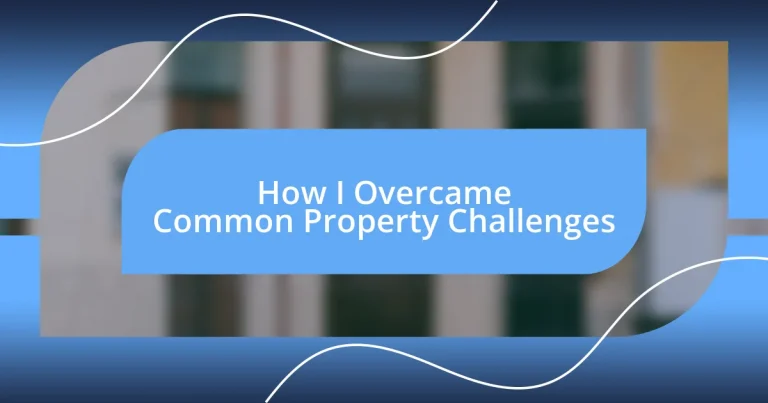Key takeaways:
- Proactive management and regular communication with tenants can help identify and resolve property issues before they escalate, enhancing tenant satisfaction.
- Effective negotiation strategies, including preparation and active listening, are crucial for resolving tenant disputes and achieving mutually beneficial agreements.
- Regular maintenance and staying informed about local real estate trends are vital for maintaining property value over time and ensuring long-term success in property management.
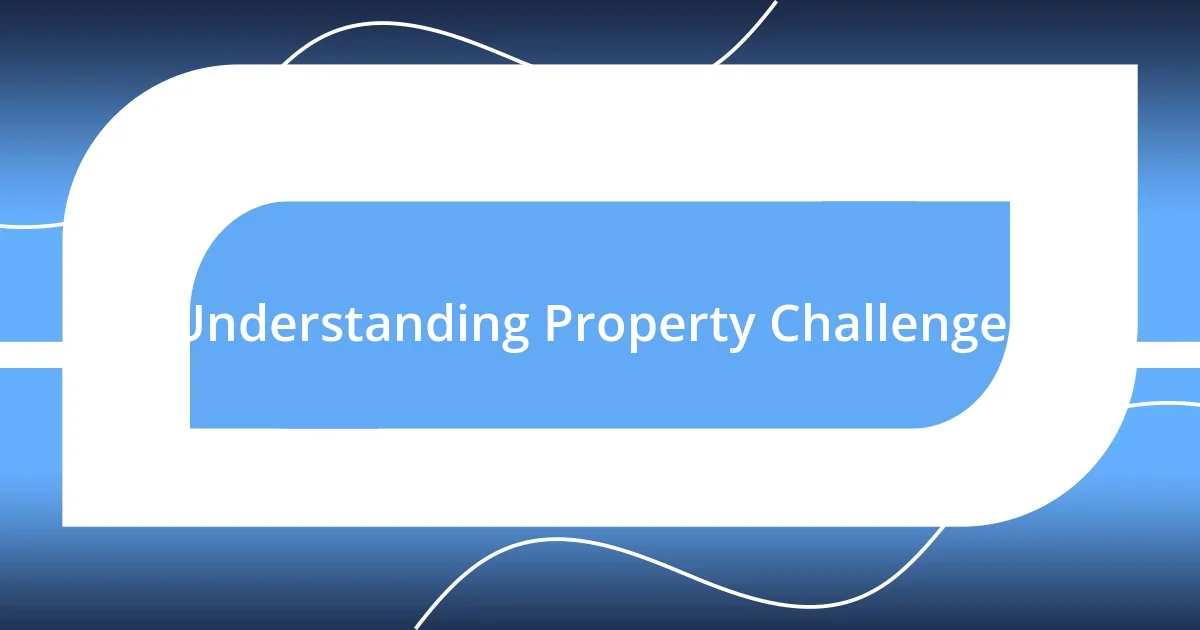
Understanding Property Challenges
When I first ventured into property management, I was shocked by how many different challenges lay ahead. From unexpected maintenance issues to navigating tenant disputes, it often felt overwhelming. I remember one particularly rainy week when a leak in my newly rented property turned into a full-blown crisis—suddenly, I was juggling repairs and trying to keep my tenants happy all at once.
Understanding property challenges means recognizing that no two situations are the same. Some are predictable, like keeping up with market trends, while others, like sudden changes in local regulations, can catch you off guard. Have you ever found yourself in a situation where you thought you had everything planned, only to hit a wall? That’s precisely what happened to me when a new law on building codes came into effect, and I was left scrambling to comply.
The emotional toll of dealing with property challenges shouldn’t be underestimated either. There were moments I felt isolated and uncertain, wondering if I had made the right choices. I often turned to property forums or local groups for advice, realizing that sharing experiences not only alleviated some of my stress but also sharpened my understanding of what others faced. Isn’t it comforting to know that you’re not alone in these hurdles?
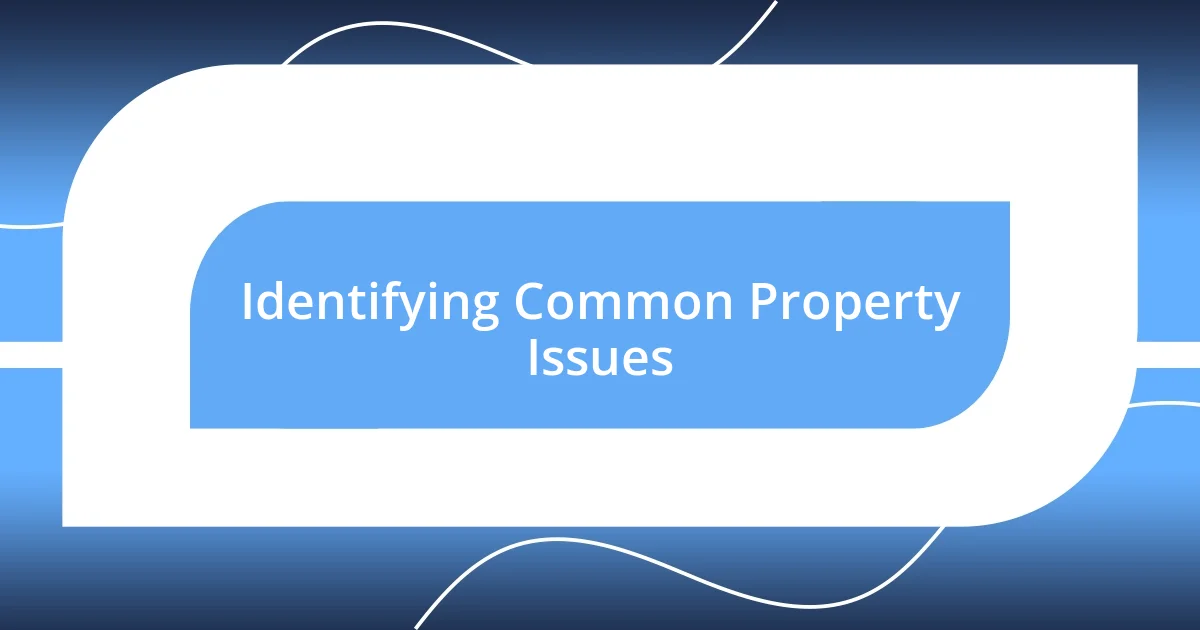
Identifying Common Property Issues
Identifying common property issues is crucial for any property manager. I often found myself caught off-guard by maintenance problems that seemed to spring up overnight. For instance, one winter, I woke up to a heating failure in one of my rentals. The chill from the freezing temperatures reverberated through my thoughts as I rushed to resolve the issue before my tenants could feel the discomfort. It was a stark reminder of how quickly challenges can arise and the importance of recognizing early warning signs.
The easiest way to spot property issues is to pay attention to the small details. I’ve learned that seemingly minor signs, like damp spots on walls or a flickering light fixture, can indicate larger underlying problems awaiting my attention. One day, I noticed a cracked tile in a bathroom, which led to a deeper inspection and revealed mold growth behind the walls. Taking immediate action not only saved me from bigger repairs later but also demonstrated my commitment to maintaining a safe environment for my tenants.
By regularly conducting property inspections and communicating with tenants, I can identify potential issues before they escalate. After all, proactive management is key to success in property ownership. The connection I build with my tenants often leads them to share concerns that I might not notice on my own. Their insights can save me a lot of time and trouble. Have you found that your tenants have flagged problems that you wouldn’t have spotted? I definitely have, and it’s made all the difference in maintaining a healthy property.
| Common Property Issues | Potential Causes |
|---|---|
| Leaky Pipes | Age, corrosion, weather changes |
| Heating Failures | Faulty system, improper maintenance |
| Mold Growth | Excess moisture, poor ventilation |
| Poor Communication | Lack of tenant feedback, unclear guidelines |
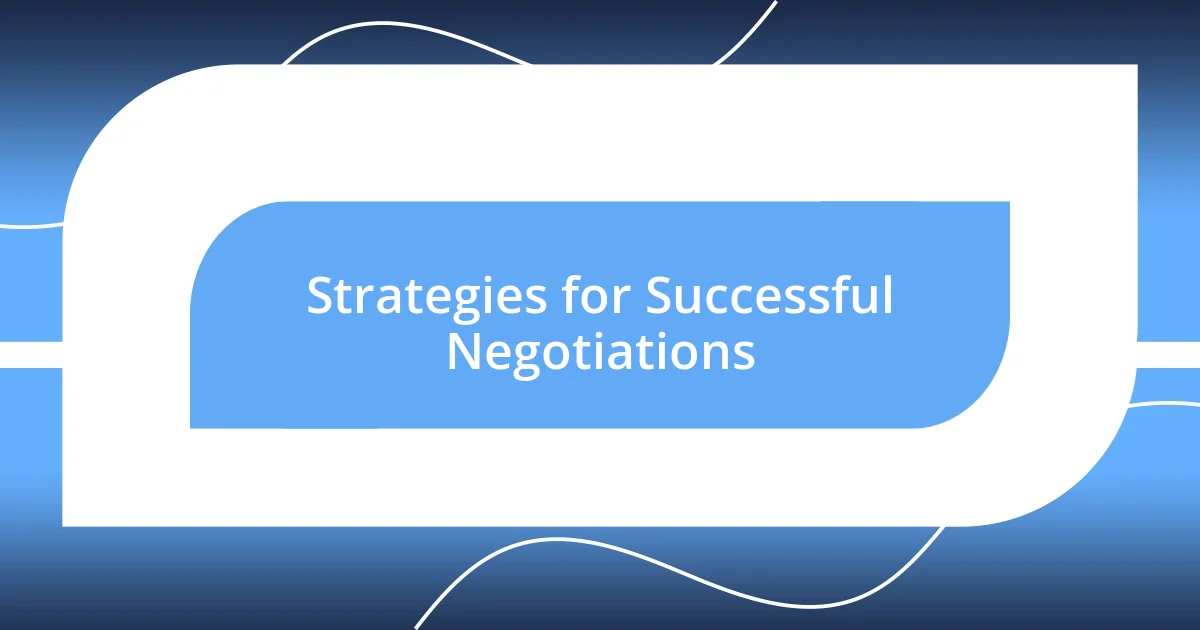
Strategies for Successful Negotiations
When it comes to negotiations, I’ve discovered that preparation is half the battle. Before entering any discussion, I make it a point to outline my goals and priorities. I remember one negotiation for a lease renewal that felt daunting, with varying expectations on both sides. By understanding my position and the market value of the property, I felt empowered, which ultimately led to a mutually beneficial agreement.
Here are some strategies I’ve found effective in successful negotiations:
- Do your homework: Research comparable properties and current market trends to strengthen your position.
- Listen actively: Pay attention to the other party’s needs and concerns; it shows respect and allows for a collaborative atmosphere.
- Stay calm and composed: Keep your emotions in check, even if the conversation gets heated—this can be crucial in reaching a steady resolution.
- Be willing to compromise: Flexibility can open doors to solutions that work for everyone.
- Practice patience: Sometimes, walking away can lead to clearer perspectives and better opportunities down the line.
Every negotiation is a learning experience. I vividly recall a time when I handled a tenant dispute regarding lease terms. I thought I was offering a fair compromise, but my tenant felt unheard. By taking a step back and reassessing my approach, I re-engaged with empathy and found common ground. It transformed the tension into a collaborative conversation. This not only resolved the issue but also strengthened our relationship moving forward.
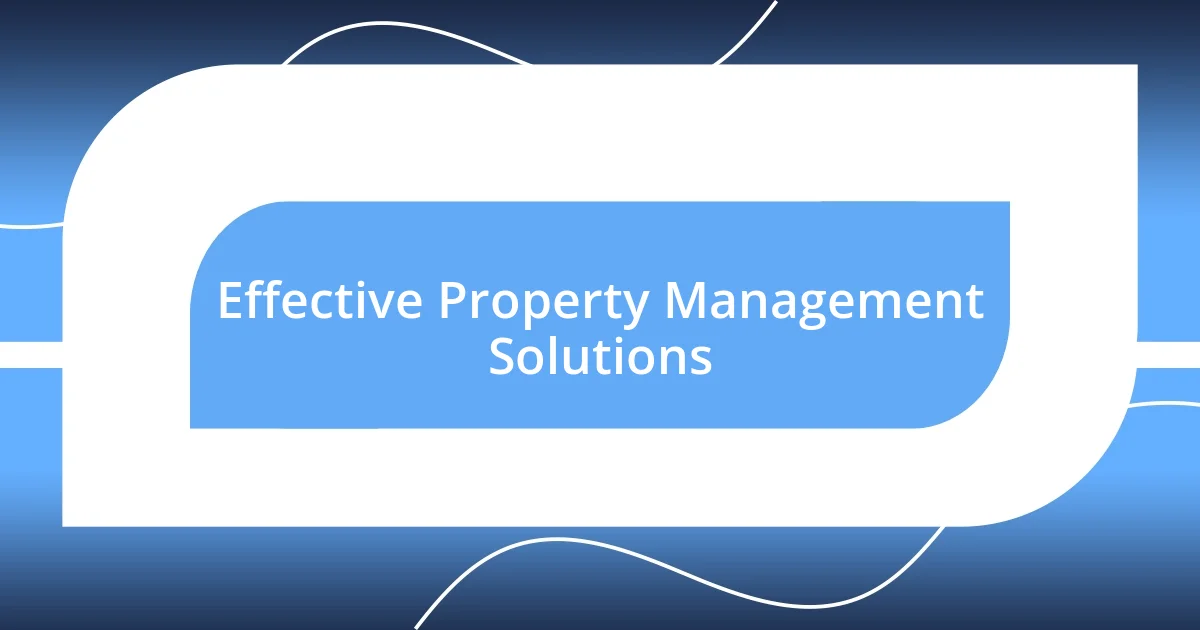
Effective Property Management Solutions
Effective property management often hinges on adopting the right solutions to streamline processes and enhance tenant satisfaction. I recall a time when I switched to a property management software system that changed the way I operated. Suddenly, I wasn’t just managing properties; I was able to track maintenance requests, tenant communication, and even rent collection all in one place. Have you ever felt overwhelmed by juggling multiple tasks? This tech upgrade saved me time and stress, allowing me to focus more on building relationships with my tenants.
Another strategy that’s served me well is establishing clear communication channels. I remember implementing a monthly newsletter for my tenants, which not only informed them about property updates but also fostered a sense of community. It’s fascinating how a simple gesture like sharing maintenance tips or local events can create goodwill. Have you tried something similar? I found that by actively engaging with my tenants, I could address concerns before they escalated into bigger problems.
Finally, I’ve learned that building a reliable network of skilled contractors can make all the difference. Once, I faced a last-minute emergency plumbing issue right before a big family visit. I called my trusted plumber, and he had the problem fixed in no time. This experience highlighted the importance of having dependable professionals at my fingertips. Regularly collaborating with experts in the field not only ensures timely repairs but also boosts my confidence in maintaining my properties. Isn’t it reassuring to know you can rely on someone when things go awry?
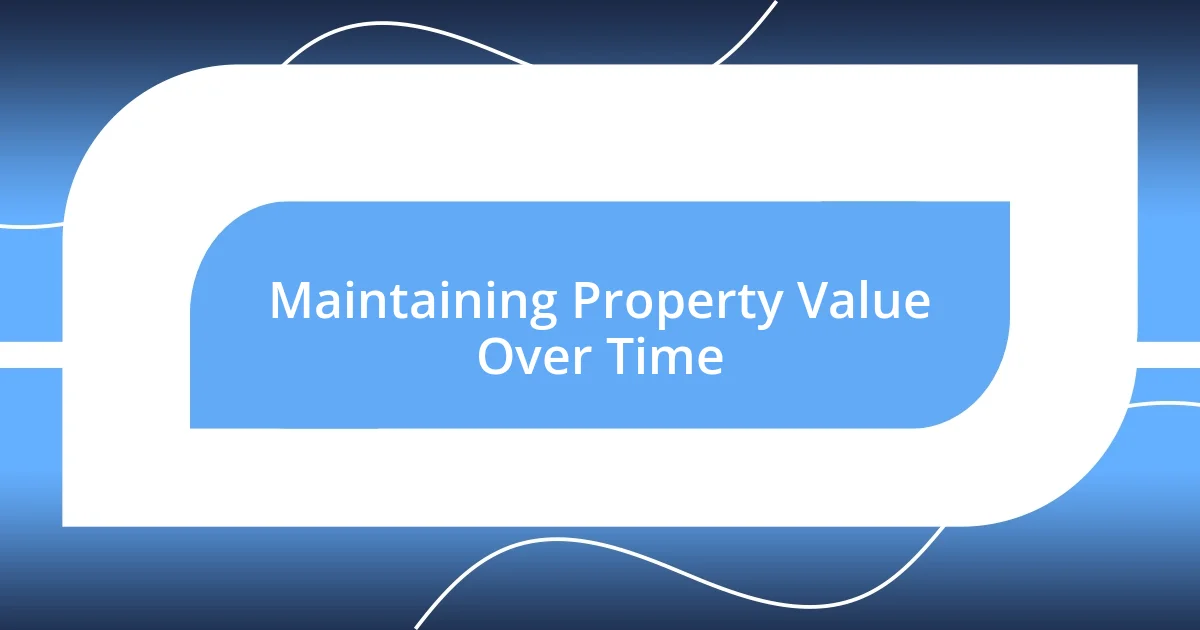
Maintaining Property Value Over Time
Maintaining property value over time is a journey, not a destination. One thing I’ve found to be incredibly important is regular upkeep. I remember when I neglected some minor repairs in a rental property. What I thought would save me time and money ended up snowballing. Those small issues grew into larger problems that required expensive fixes, impacting both tenant satisfaction and property value. It really hit home for me that regular maintenance is an investment, not a cost.
Another crucial aspect is staying informed about the local real estate market. I often find myself attending community meetings and connecting with local realtors. After all, understanding trends—like upcoming developments or changes in zoning laws—can drastically affect property values. There was a time when I was unaware of a major new shopping center planned just down the road. Once I learned about it, I quickly adjusted my rental rates, which turned out to be a savvy move that resulted in a surge of interest from potential tenants. Would I have made that adjustment without awareness? Probably not.
Finally, I’ve realized that improving curb appeal is an ongoing process, not something you do just once. I’ve experimented with various landscaping ideas, and I fondly recall the day I planted flowers in front of one of my properties. The vibrant colors transformed the home’s appearance overnight, drawing more attention from passersby. You’d be amazed at how little changes can make a big difference. Have you ever considered how a well-maintained exterior can set the tone for your property’s overall value? It’s often the first impression that sticks, and I’ve learned that maintaining that impression is vital for long-term success.
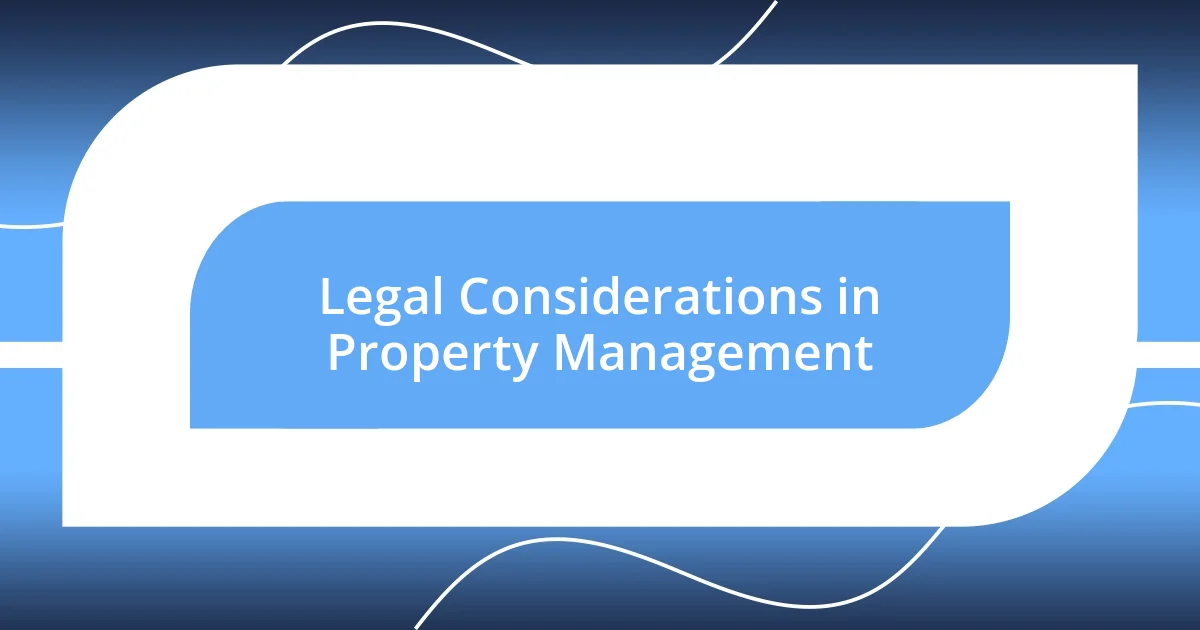
Legal Considerations in Property Management
Navigating the legal landscape in property management can feel daunting, but I’ve found that understanding the basics makes a world of difference. For instance, I remember when I first dealt with tenant leases—there was so much legal jargon! After investing time in learning about fair housing laws and local regulations, I felt much more confident drafting agreements. This knowledge helped me avoid potential disputes, which was a huge relief.
Another crucial aspect that I faced was handling tenant disputes. I once had a situation where two tenants had a disagreement over noise levels. Instead of letting it escalate, I remembered the importance of impartiality. I took the time to mediate and refer to the lease agreement, which clearly outlined noise restrictions. It taught me that having clear rules not only protects my properties but also fosters a respectful community. Isn’t it interesting how a little patience can pave the way for smoother resolutions?
Moreover, I learned about the importance of keeping proper documentation. Initially, I found it tedious, but now I see it as a lifesaver. For example, I started maintaining records of maintenance requests, late rent payments, and correspondence. Once, a tenant questioned a charge on their bill, and I was able to pull up the documentation swiftly. It not only resolved the issue but also reassured the tenant of my professionalism. Doesn’t it feel great to have your back covered when misunderstandings arise? Embracing these legal considerations has truly transformed my management approach.
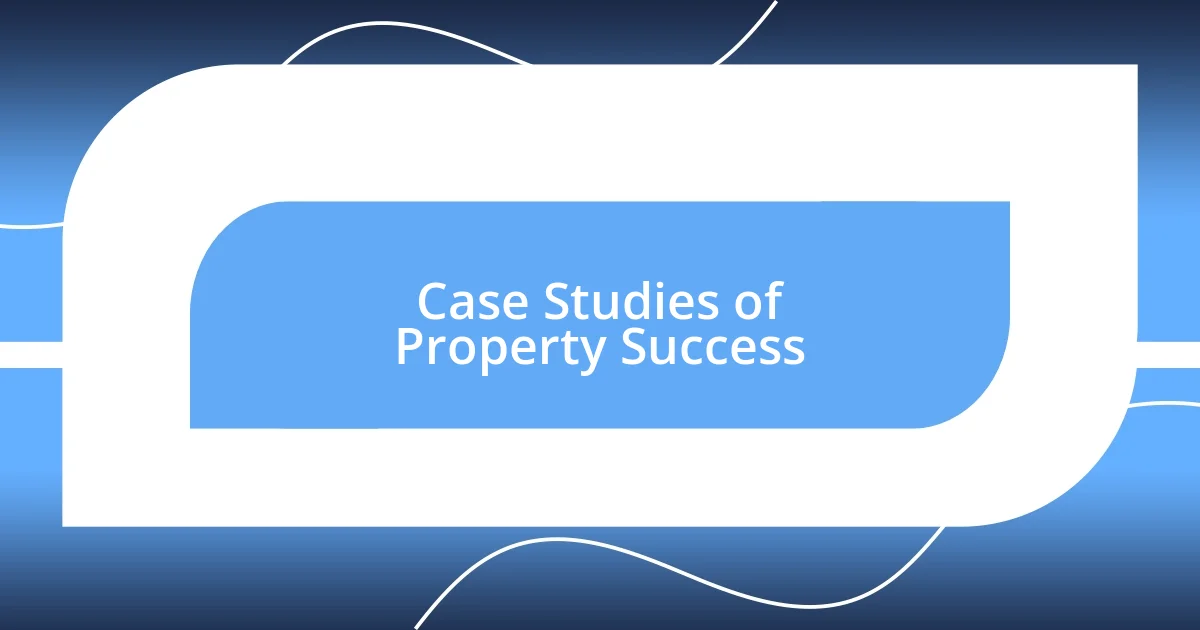
Case Studies of Property Success
One of my favorite success stories in property management involves a charming duplex I purchased in a small town. It had potential, but it required a considerable facelift. Instead of doing the typical cosmetic upgrades, I decided to dive into energy efficiency improvements. After installing new windows and a modern heating system, I was amazed to see the tenants happily reporting reduced utility bills. Isn’t it fascinating how doing right by the environment can also benefit your bottom line?
Another memorable case involved a rental property that experienced high turnover rates. It was frustrating, to say the least. I reached out to my tenants to understand their experiences and found that communication had been lacking. By implementing regular check-ins and creating a tenant newsletter, I fostered a sense of community that ultimately kept people around longer. Have you ever thought about how a simple conversation can drastically change your relationship with tenants? It really highlighted for me that engagement is just as important as the property itself.
Lastly, I once transformed an underperforming property by embracing the idea of multi-functional spaces. During a renovation, I created a home office nook in the corner of a living room. To my surprise, this small addition skyrocketed interest during viewings! People loved the idea of working from home with a dedicated space. It reinforced my belief that understanding modern lifestyles can lead to increased appeal and value. Have you ever considered how little tweaks can open up new possibilities? This case was a reminder that adaptability is key in property success.












